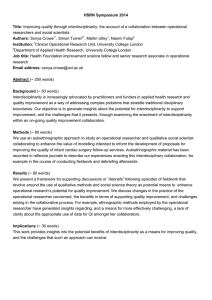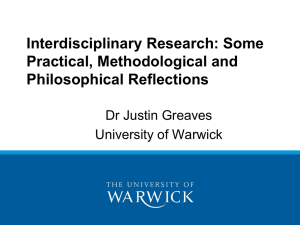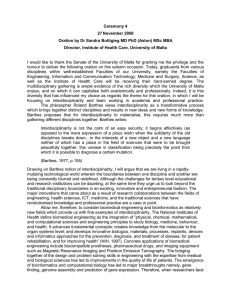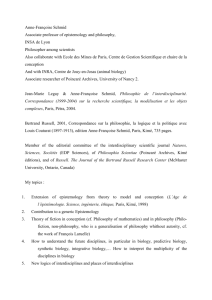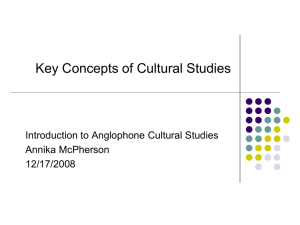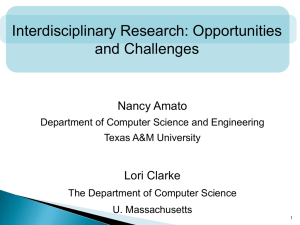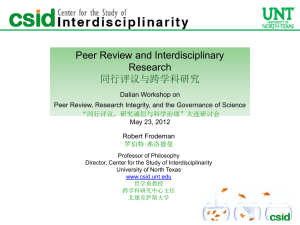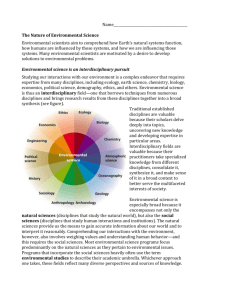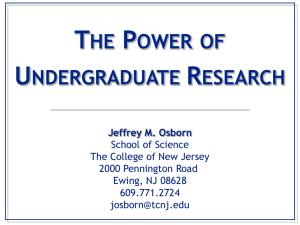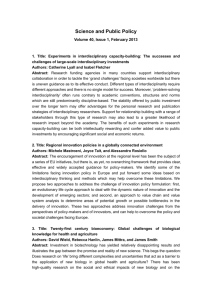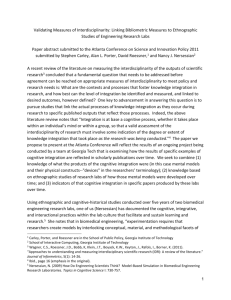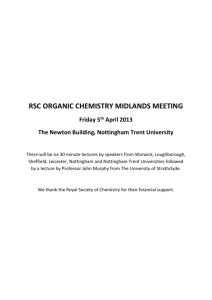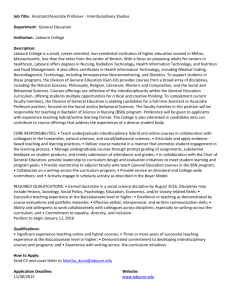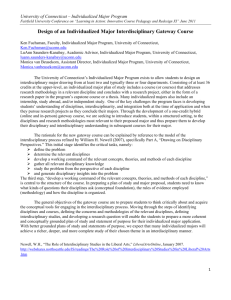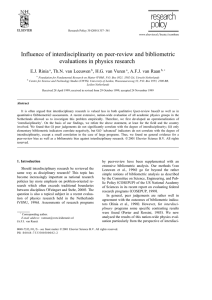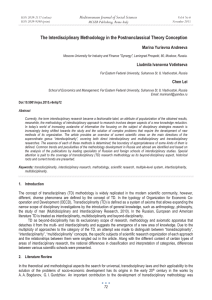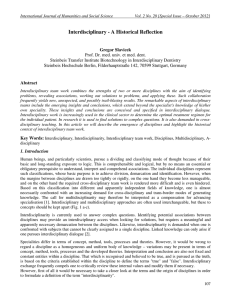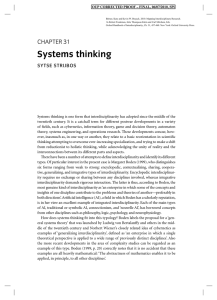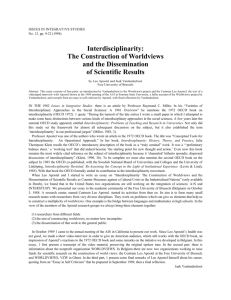Keynote Speakers - University of Nottingham
advertisement
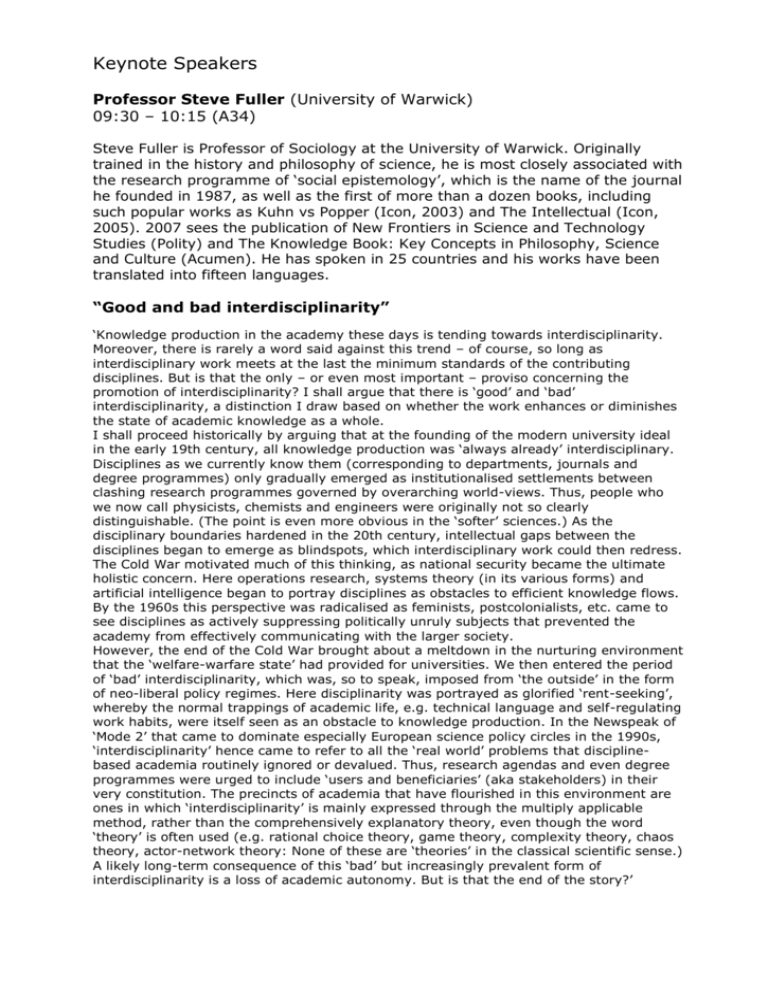
Keynote Speakers Professor Steve Fuller (University of Warwick) 09:30 – 10:15 (A34) Steve Fuller is Professor of Sociology at the University of Warwick. Originally trained in the history and philosophy of science, he is most closely associated with the research programme of ‘social epistemology’, which is the name of the journal he founded in 1987, as well as the first of more than a dozen books, including such popular works as Kuhn vs Popper (Icon, 2003) and The Intellectual (Icon, 2005). 2007 sees the publication of New Frontiers in Science and Technology Studies (Polity) and The Knowledge Book: Key Concepts in Philosophy, Science and Culture (Acumen). He has spoken in 25 countries and his works have been translated into fifteen languages. “Good and bad interdisciplinarity” ‘Knowledge production in the academy these days is tending towards interdisciplinarity. Moreover, there is rarely a word said against this trend – of course, so long as interdisciplinary work meets at the last the minimum standards of the contributing disciplines. But is that the only – or even most important – proviso concerning the promotion of interdisciplinarity? I shall argue that there is ‘good’ and ‘bad’ interdisciplinarity, a distinction I draw based on whether the work enhances or diminishes the state of academic knowledge as a whole. I shall proceed historically by arguing that at the founding of the modern university ideal in the early 19th century, all knowledge production was ‘always already’ interdisciplinary. Disciplines as we currently know them (corresponding to departments, journals and degree programmes) only gradually emerged as institutionalised settlements between clashing research programmes governed by overarching world-views. Thus, people who we now call physicists, chemists and engineers were originally not so clearly distinguishable. (The point is even more obvious in the ‘softer’ sciences.) As the disciplinary boundaries hardened in the 20th century, intellectual gaps between the disciplines began to emerge as blindspots, which interdisciplinary work could then redress. The Cold War motivated much of this thinking, as national security became the ultimate holistic concern. Here operations research, systems theory (in its various forms) and artificial intelligence began to portray disciplines as obstacles to efficient knowledge flows. By the 1960s this perspective was radicalised as feminists, postcolonialists, etc. came to see disciplines as actively suppressing politically unruly subjects that prevented the academy from effectively communicating with the larger society. However, the end of the Cold War brought about a meltdown in the nurturing environment that the ‘welfare-warfare state’ had provided for universities. We then entered the period of ‘bad’ interdisciplinarity, which was, so to speak, imposed from ‘the outside’ in the form of neo-liberal policy regimes. Here disciplinarity was portrayed as glorified ‘rent-seeking’, whereby the normal trappings of academic life, e.g. technical language and self-regulating work habits, were itself seen as an obstacle to knowledge production. In the Newspeak of ‘Mode 2’ that came to dominate especially European science policy circles in the 1990s, ‘interdisciplinarity’ hence came to refer to all the ‘real world’ problems that disciplinebased academia routinely ignored or devalued. Thus, research agendas and even degree programmes were urged to include ‘users and beneficiaries’ (aka stakeholders) in their very constitution. The precincts of academia that have flourished in this environment are ones in which ‘interdisciplinarity’ is mainly expressed through the multiply applicable method, rather than the comprehensively explanatory theory, even though the word ‘theory’ is often used (e.g. rational choice theory, game theory, complexity theory, chaos theory, actor-network theory: None of these are ‘theories’ in the classical scientific sense.) A likely long-term consequence of this ‘bad’ but increasingly prevalent form of interdisciplinarity is a loss of academic autonomy. But is that the end of the story?’ Keynote Speakers Professor Kevin Shakesheff (University of Nottingham) 16:40 – 17:25 (A34) Professor Shakesheff is Professor of Advanced Drug Delivery and Tissue Engineering (based in the School of Pharmacy) at the University of Nottingham. He has a keen interest in interdisciplinary research in the natural sciences and has recently headed an advisory group on developing and supporting interdisciplinary research at the University of Nottingham. Professor Shakesheff’s group is developing new methods of engineering liver, nerve, cartilage, muscle and bone tissue for drug screening and medical applications. He has previously held fellowships at MIT (NATO) and Nottingham (EPSRC). “The Centre for Biomolecular Sciences: Bringing 8 Schools together to do interdisciplinary research” ‘The University of Nottingham has invested over £25 million on a new Centre of Biomolecular Sciences (CBS). This ambitious project brings together over 300 researchers from 8 Schools across 3 Faculties. This presentation will explore the issues involved in establishing such a large scale collaboration. Examples of research, including tissue engineering, stem cell technology, drug discovery and bacteriology will be used to highlight the concept of CBS.’

